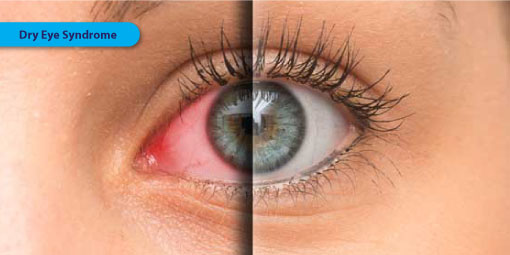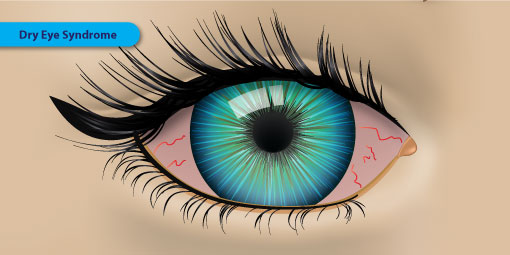Dry Eye Syndrome - Symptoms, Causes and Treatment
07-04-2024
What is Dry Eye Syndrome?
Dry Eye Syndrome is a common eye condition that occurs when the eyes do not produce enough tears or when the tears evaporate too quickly. This can lead to discomfort, irritation, and a gritty feeling in the eyes. It can also cause blurred vision and sensitivity to light. Dry Eye Syndrome can be chronic and affect daily activities such as reading, driving, and using a computer. Proper management and treatment are important to alleviate symptoms and improve overall eye health.
What Are The Causes Of Dry Eye Syndrome?
Dry Eye Syndrome is caused by a variety of factors that can affect the quality or quantity of tears produced by the eyes. Some common causes include aging, hormonal changes, certain medications, environmental factors like dry air or wind, and underlying health conditions such as autoimmune diseases. Other factors that can contribute to dry eye include prolonged screen use, certain medical procedures, and wearing contact lenses for extended periods of time. These factors can disrupt the normal tear film on the surface of the eye, leading to symptoms of dryness, irritation, and discomfort.What Are The Risk Factors For Dry Eye Syndrome?
Risk factors for Dry Eye Syndrome include aging, being female, hormonal changes, certain medical conditions such as rheumatoid arthritis or diabetes, certain medications like antihistamines or decongestants, environmental factors such as dry or windy climates, and prolonged screen time or contact lens wear. Additionally, smoking and poor nutrition can also increase the risk of developing Dry Eye Syndrome. Regular eye exams and proper eye care can help to manage and alleviate the symptoms associated with this common eye condition.What Are The Symptoms Of Dry Eye Syndrome?
Symptoms of Dry Eye Syndrome may include a scratchy or gritty sensation in the eyes, redness, sensitivity to light, blurred vision, excessive tearing, and a feeling of something being stuck in the eye. Some individuals may also experience discomfort when wearing contact lenses or have difficulty driving at night due to glare. These symptoms can vary in severity and may worsen in certain environments, such as in dry or windy conditions. It is important to consult with an eye care professional if you are experiencing any of these symptoms to determine the appropriate course of treatment.How is Dry Eye Syndrome Diagnosed?
Dry Eye Syndrome is diagnosed through a comprehensive eye examination conducted by an optometrist. During the exam, the optometrist will evaluate the patient's medical history and symptoms related to dry eyes. Various tests may be performed to assess the quantity and quality of tears produced by the eyes, as well as the overall health of the ocular surface. These tests may include measuring tear production, evaluating tear film stability, and examining the cornea and conjunctiva for signs of dryness or damage. Some clinics, like ours, have a keratograph that assess can perform dry eye analysis non-invasively. Based on the results of these tests, the optometrist can determine if the patient has Dry Eye Syndrome and recommend appropriate treatment options.How is Dry Eye Syndrome Treated?
Dry Eye Syndrome is typically treated through a variety of methods aimed at improving the quality and quantity of tears in the eyes. One common treatment option is the use of artificial tears or lubricating eye drops to provide relief from dryness and discomfort. In more severe cases, prescription eye drops may be recommended to reduce inflammation and increase tear production. Another effective treatment is the use of punctal plugs, which are small devices inserted into the tear ducts to block drainage and keep tears on the surface of the eye longer. In some cases, lifestyle changes such as using a humidifier, avoiding exposure to dry air or wind, and taking breaks during activities that strain the eyes can also help alleviate symptoms of Dry Eye Syndrome.Is There A Cure For Dry Eye Syndrome?
Currently, there is no definitive cure for Dry Eye Syndrome. However, there are various treatment options available that can help manage the symptoms and improve the overall comfort of patients suffering from this condition. These treatments may include over-the-counter artificial tears, prescription eye drops, punctal plugs, and lifestyle modifications. It is important for individuals experiencing symptoms of Dry Eye Syndrome to consult with their eye care provider to determine the most appropriate treatment plan for their specific needs.How Can Dry Eye Syndrome Be Prevented?
Dry Eye Syndrome can be prevented by taking steps to maintain good eye health and proper eye care. This includes staying well-hydrated by drinking plenty of water, as dehydration can exacerbate dry eye symptoms. Additionally, avoiding exposure to smoke, wind, and dry environments can help prevent irritation and dryness in the eyes. Taking breaks when using digital devices for extended periods of time and using artificial tears or lubricating eye drops can also help keep the eyes moist and prevent dryness. Lastly, wearing sunglasses to protect the eyes from UV rays and using a humidifier in dry indoor environments can help prevent dry eye symptoms.Regular eye exams with advanced technologies are essential for the early detection and treatment of dry eye syndrome. Schedule an eye exam with an optometrist today!
Schedule An Appointment
Adult Eye Exams
Our advanced eye exams consist of 25+ modern tests and digital scans to assess eye health, function, and visual acuity.

Child Eye Exams
Give your child a clear future with an annual eye exam from our experienced Edmonton optometrists.

Senior Eye Exams
Maintain your vision through your golden years with gold standard eye care from the optometrists at our Edmonton eye clinic.

Contact Lens Eye Exams
Our eye exams for contact lens wearers include test and digital scans to assess eye health, function, visual acuity, and lens fit.

Diabetic Eye Exams
Managing diabetes requires regular eye exams to ensure that diabetes is not causing irreversible vision loss.

Dilated Eye Exams
Dilating the eyes enables our Edmonton optometrists to see more of the eye so that you many never see less.
Our Edmonton Eye Exams Are Comprised Of 4 Phases Of Evaluation

1. Eye Exam Pre-Testing
Corneal Thickness | Intraocular Pressures | Visual Field
Pre-testing is a detailed process that gathers all necessary information for the optometrist in advance of the optometrist-administered eye examination. This process involves completing a detailed patient history, as well as a series of standard tests. Pre-testing is an essential part of the comprehensive eye exam process, providing valuable information and visuals for both the optometrist and the patient.
More About Pre-Testing »
2. Advanced Diagnostic Testing
Retinal Photography, OCT, Topography
eye-deology Vision Care differentiates itself from other clinics by having the most advanced modern diagnostic specialty testing equipment. Specialty equipment, such as a wide-angle high-resolution retinal imager, Optical Coherence Tomography (OCT), Humphrey Visual Field Analyzer and corneal topographer, ensures that patients receive the best comprehensive eye care.
More About Advanced Testing »
3. Optometrist Examination
Health Assessment & Disease Diagnosis
eye-deology Vision Care Edmonton optometrists perform a multitude of tests and assessments to evaluate ocular health, eye coordination, and visual acuity. In addition, they also evaluate the results of the tests and scans performed during pre-testing. As part of patient education, our optometrists also take the time to show and explain results to patients.
More About Doctor Exam »
4. Eye Glass Consult
Prescription | Lens Selection | Digital Fitting
If you require corrective lenses to improve your vision, our licensed opticians will customize their fit to your unique attributes, needs, lifestyle, and budget. Our opticians are happy to provide you with information about the latest eyeglass frame and lens technologies available so you can make informed decisions and begin seeing and looking your best.
More About Eyewear Consult »